Office of International Strategy
Center for Science Communication,
https://www.jst.go.jp/sis/ (Japanese)
The Science Forum South Africa (SFSA) hosted by the South Africa Department of Science and Technology (DST) is the largest scientific open forum in Africa. It was held in Pretoria (the administrative capital), focusing on “Well-being and prosperity through science and technology innovation.” More than 2,000 individuals from over 60 countries of Sub-Saharan Africa (mostly from South Africa), Europe, America and Asia attended the forum. The participants were policymakers, athenaeums, laboratories, and researchers. JST hosted some sessions and took the rostrum, and jointly exhibited a booth with the Embassy of Japan in South Africa, etc.
In the session “Sustainable Developments Goals (SDGs) and Public Engagements (public involvement)” sponsored by the Center for Science Communication (CSC), the experts from Euro Science, UNESCO Latin America and the Caribbean Branch and South Azur Land Science Center (recommended by National Museum of Emerging Science and Innovation) took the rostrum. From JST, specially appointed fellow, Mr. OTAKE of the Center for Research and Development Strategy (CRDS), and Prof. MATSUDA from Yokohama Univ. (area advisor of CREST “Marine Biodiversity”) joined the session. The researchers shared information for the implementation of SDGs. It was also pointed out that collaboration between humanities and social sciences, and co-creation with society will be integrated and that the continuous discussion in a world-wide scientific forum would be required. The full audience of approximately 60 people showed active interests on SDGs. The Q&A session went beyond the scheduled time. The site visit to Soweto, a slum in a bad environment, provided an opportunity to feel the true importance of “SDG’s Goal 1: End poverty in all its forms everywhere.”
Participants of the “Scientific advisors” were university professors from the UK and South Africa, as well as experts from DST and UNESCO including former European scientific advisor. From JST, Sr. fellow of CRDS, Prof. ARIMOTO attended the session. The participants, together with the audience, discussed the importance and the issues of the “Twenty-point plan for science policy,” in which more than 300 individuals from 35 countries examined the science policy-making over a period of 5 years. It was made known that the report including the results of that discussion would be published in online magazine “Nature” in January 2017 as the “Brussels Declaration: Twenty-point plan for science policy.”
The exhibition booth “Japan Knowledge-Research and Higher Education Opportunity” of the Embassy of Japan in South Africa —the sole booth from Asia—was jointly organized by JST, JICA, and the South African Embassy in Japan. The joint booth introduced the initiatives for Africa in “Japan’s knowledge-opportunities in higher education and research.” In the two days, more than 150 individuals visited the joint booth. The visitors were interested in the opportunities of research collaboration and study in Japan, including the “Securing Environment and Water Resources,” a research supported by SATREPS. The joint booth was selected as one of the three most excellent exhibitions by DST and South Africa S&T Minister Pandor Minister Pandor of Science and Technology presented the award at the closing session.
During the forum, the representatives of the six main world-wide scientific forums—the American Association for the Advancement of Science (AAAS), Euro Science Open Forum (ESOF), World Science Forum (WSF), Latin American and Caribbean Open Science Forum (CILAC), SFSA, and Science Agora in Japan—held a mini-session to improve their presence in Africa and enhance collaborations among the organizers. The discussion highlighted the difference of each forum, but also confirmed the common issues. For example, there is the need to encourage young people to get plugged-in to science and technology.
Minister Pandor sent strong messages: reducing poverty, inequality and unemployment through science and technology are national priorities. For the future, it is important to: 1) adapt the results of the science technology innovation into the African and global economies, 2) ensure the achievements for SDGs focus on human value through science and technology innovation, and 3) never give-up the sense of mission,
So far, JST has collaborated with the African countries via international cooperation promotion projects for promoting international cooperation and the government-led Tokyo International Conference on African Development (TICAD). JST also has deepened collaborations with DST, the South African Agency for Science and Technology Advancement (SAASTA) and the South African Embassy in Japan through the open forums such as SFSA, ESOF and Science Agora. Based on these collaborations, JST will continue the discussions to find solutions for the global issues, together with the scientific forum representatives and the stakeholders in the scientific communities.
The 3rd SFSA will be held Pretoria in December 2017.
- 【Reference】
- ■Science Forum South Africa
https://www.sfsa.co.za/ - ■Brussels Declaration: Twenty-point plan for science policy(Nature 541, 289 (19 January 2017))
Summary: https://www.nature.com/articles/541289a
Full text: http://www.sci-com.eu/main/docs/Brussels-Declaration.pdf - ■Science, Technology and Innovation (STI) for implementation of SDGs: JST’s action
http://www.jst.go.jp/EN/about/sdgs/index.html - ■JST Topics: JST Hosts Sessions and Sets up Stand at Euro Science Open Forum (ESOF) 2016
https://www.jst.go.jp/report/2016/160901_e.html
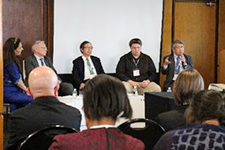
SDGs Session
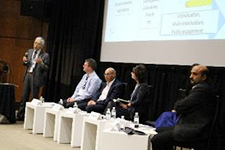
Scientific Advice Session
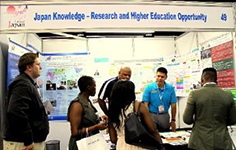
Joint Booth “Japan Knowledge-Research and Higher Education Opportunity”
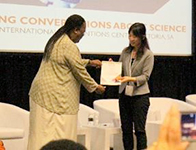
Receiving the exhibition award from South Africa Science and Technology Minister PANDOR.
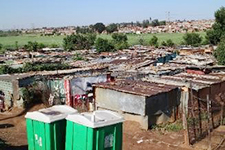
Site Visit to Soweto
JST, an integrated organization of science and technology in Japan, establishes an infrastructure for the entire process from the creation of knowledge to the return to the society. For more information, visit http://www.jst.go.jp/EN/